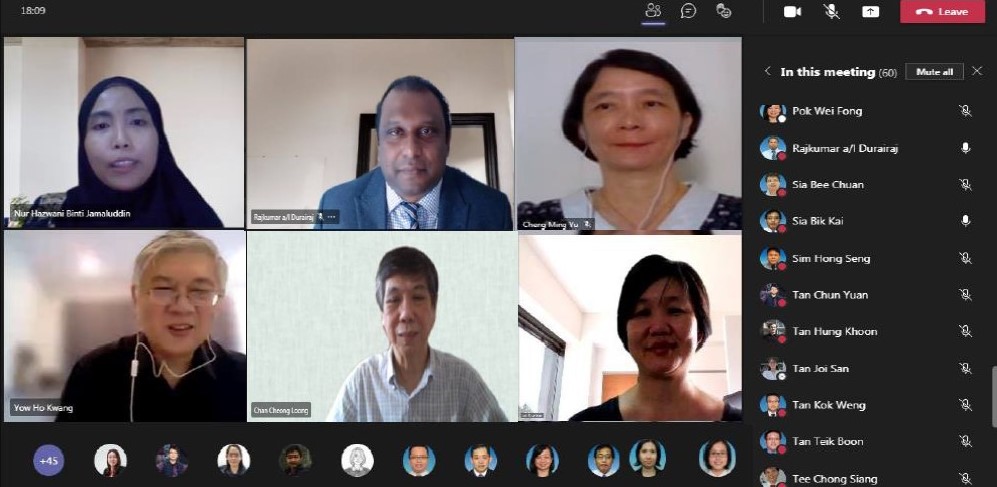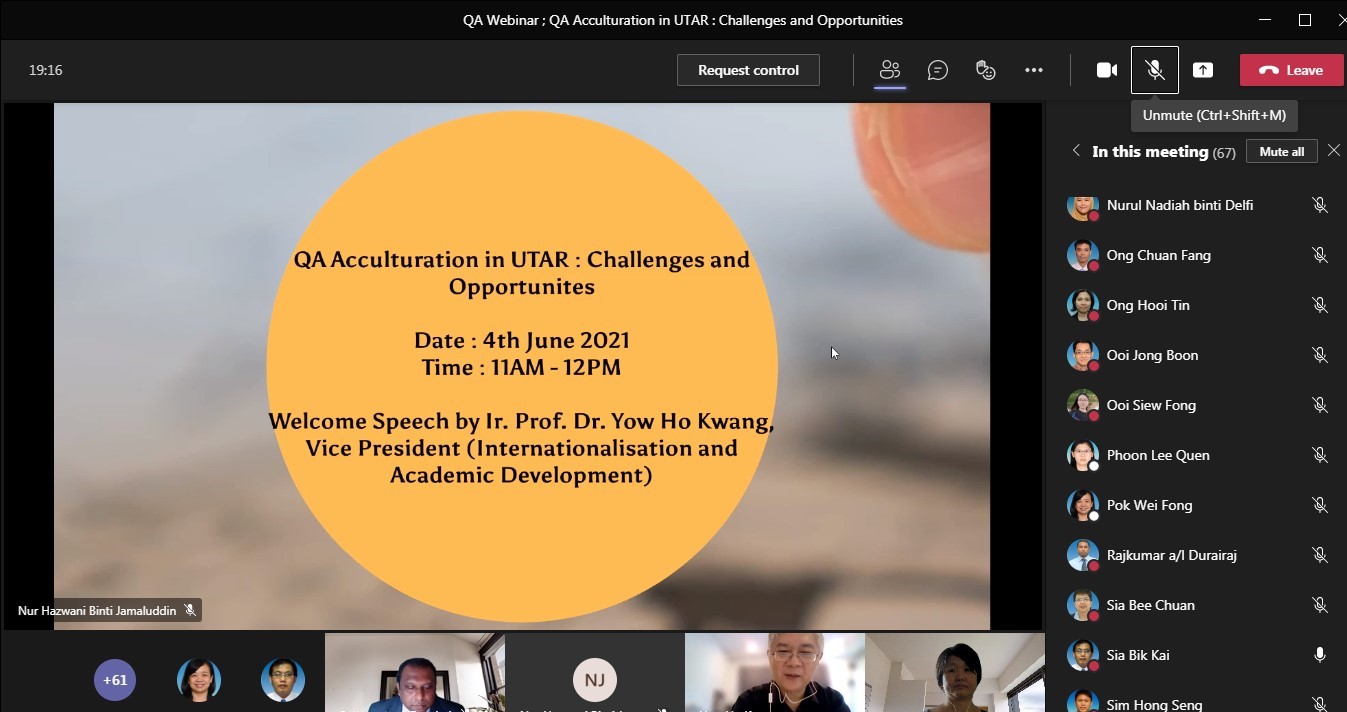
Enlightening participants on QA acculturation in UTAR
Enlightening 88 participants on the challenges and opportunities of quality assurance (QA) acculturation in UTAR was the webinar on “QA Acculturation in UTAR: Challenges and Opportunities”, organised by UTAR Accreditation Committee and Division of Quality Assurance (DQA) on 4 June 2021 via Microsoft Teams.

Clockwise from top left: Webinar emcee Nur Hazwani Jamaluddin, Prof Rajkumar, Prof Cheng, Loh, Dr Chan and Prof Yow
The aim of the webinar was to raise awareness of QA culture in UTAR. The webinar also emphasised on self-accreditation, which is one of the most important QA aspects and processes in UTAR. Present as panellists to discuss this topic were Lee Kong Chian Faculty of Engineering and Science Academic Quality Assurance Dean Ir Prof Dr Rajkumar Durairaj, DQA Director Loh Siaw Yien and Faculty of Engineering and Green Technology academic Ir Dr Chan Cheong Loong, and the discussion was moderated by Institute of Management and Leadership Development Director Prof Dr Cheng Ming Yu.
Kick-starting the webinar was Vice President for Internationalisation and Academic Development Ir Prof Dr Yow Ho Kwang. “UTAR was awarded the self-accreditation status in February 2017 and this status is valid for five years. Many of the universities that obtained this status are those with strong academic and impactful research. With this self-accreditation status, it provides a higher degree of recognition, based on the university’s performances, in addition to enhancing and strengthening its internal quality assurance system,” explained Prof Yow. He went on to list the criteria that the university met, which resulted in the self-accreditation status.

Prof Yow (bottom row, second from right) highlighting the benefits of the self-accreditation status
He added, “This status also offers the university many benefits, including the university being able to accredit its own programmes through the Senate. Apart from that, this status gives the university the opportunity to optimise its resources in enriching the quality of the offered programmes more efficiently and effectively based on the university’s capability. Lastly, this self-accreditation status is a badge of honour which can be used to attract students and staff to the university.”
The webinar was also organised as part of the University’s continuous effort to improve and maintain its internal quality assurance system and to ensure that the University will continuously secure the self-accreditation status.
First to speak was Prof Rajkumar on the topic “UTAR Self-accreditation – A Systematic Approach to the Provision of Quality Education”. In his talk, participants learnt about the concept of quality higher education. His talk further highlighted the quality assurance in the regional level (specifically in the ASEAN region), basic definition of Accreditation, standard of the quality assurance documents, university Internal Quality Assurance Framework, and functions of DQA in the university. Prof Rajkumar also explained that DQA always refers to the Malaysian Qualifications Framework (MQF) as well as the MQA standards and guidelines in carrying out UTAR self-accreditation procedures and requirements.
The webinar continued with the second speaker Loh on “UTAR Self Accreditation Processes and Documentation”. Loh informed that the self-accreditation processes do not cover professional programmes such as Engineering, Medical, Nursing and Quantity Surveying programmes, as those programmes are governed by professional bodies. Besides briefing on the objectives and key stages of the self-accreditation procedures and the relevant documentation, Loh also highlighted the importance of key players, such as the Self-Assessment Committee (SAC), External Review Panel (ERP) and DQA in making the programme accreditation evaluation a success. She also shared the challenges faced by DQA and improvement action taken while conducting the self-accreditation process.
The third speaker, Dr Chan spoke on “Provisional, Full and Maintenance Accreditation”. Dr Chan explained the good practices in provisional, full and maintenance of accreditation, and the documents needed for the good practices in accreditation.
The webinar ended with an interactive Q&A session, which saw participants asking questions relating to the concerns of practical session and the expectation of EAC during the MCO period and actions of quality assurance taken for online assessment and classes. According to Prof Rajkumar, EAC has provided a guideline on teaching, learning and assessment implementation during the Covid-19 pandemic, which the University has complied with since 2020. Meanwhile, QA for online assessment and classes were determined after having discussion with the respective departments, which resulted in the University producing relevant guidelines for implementation of final assessment in replacement of final examination. Other questions raised also included the improvement of the processes and documentation. According to Loh, UTAR’s self-accreditation processes have been benchmarked with MQA and professional body processes. As for the documentation, the accreditation evaluation processes emphasised evidence provided to verify programme compliance, continual quality improvement and programme sustainability. The faculty’s effective record-keeping system is important to ease the accreditation process. Dr Chan added a final remark, saying, “Quality is just a minimum standard for one university to achieve, hence the university should present a good reputation of evidence for accreditation, as it does portray the university’s credibility to achieve higher level than the minimum standard sets for attaining the good quality level in education.”
© 2021 UNIVERSITI TUNKU ABDUL RAHMAN DU012(A).
Wholly owned by UTAR Education Foundation (200201010564(578227-M)) LEGAL STATEMENT TERM OF USAGE PRIVACY NOTICE